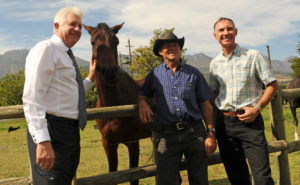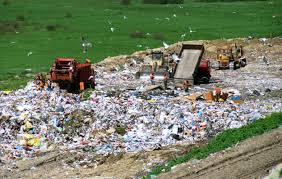A case of mistaken identity has caused consternation among residents of the Rondeberg area in the Western Cape this week. The problem arose due to the restrictions involved in disposing of animal carcasses. Municipal regulations stipulate that animals may not be buried in urban areas due to the risk of contamination of the water table. The Municipality does assist with the disposal of carcasses and these are usually transported to the local municipal landfill site.
Because many people find the idea of a beloved pet being disposed of at a municipal landfill unpalatable, there are a number of alternative options, including cremation or private burial.
Pet Farewells is a company specialising in animal mortality collections and burials and due to a case of mistaken identity and bad timing, have inadvertently been caught in the crossfire of the latest African Horse Sickness outbreak.
Sequence of events

(left to right) MEC Alan Winde with Wikus Hanekom of Schoongezicht Farm in Paarl and Chief State Vet: Boland, Dr Gary Buhrmann (photo: Tracey Adams)
On Friday, 8 April 2016, a horse died on Schoongezicht farm in the Paarl area of the Western Cape. Subsequent investigations confirmed that the death had been as a result of African Horse Sickness and the Western Cape authorities imposed an immediate containment area and a ban on horse movements in the area.
The Schoongezicht horse was later buried on the farm.
In an entirely separate incident, a horse was euthanased due to complications from laminitis at a private veterinary facility in the Paarl area on Monday, 11 April 2016. The horse owners originally elected to have the body taken to the Wellington municipal dump site and applied for and received the requisite movement permits from State Vet Boland. Chief State Vet, Dr Gary Buhrmann confirmed, “The animal had been put to sleep due to complications arising from laminitis and posed absolutely no threat to the local horse population.”
Prior to the body being moved to the Wellington municipal dump site, the owners had a change of heart and contacted Pet Farewells to collect the body and dispose of the remains via their ‘green burial’ service.
Mandy Jones of Pet Farewells explains that they had originally operated from a site in Philippi and were in the process of relocating to a new site in Camphill. Because the new facility in Camphill was in the process of being set up, they had not prepared any formal burial sites. However, such was the distress of the owners over the death of their horse, that they endeavoured to help. An added complication was that being so new, Pet Farewells had not yet made themselves and their business known to the local residents.
Unaware of the newly imposed movement restrictions, Pet Farewells collected the horse’s body from the veterinary facility on Monday, 11 April evening and drove it through to their new Camphill site. Mandy explains that the site was very sandy and in order to avoid getting their vehicle stuck, the driver moved it to an area of firmer ground.
On sighting the vehicle and the body of a dead horse, with no requisite documentation, local residents were naturally concerned, believing it to be the AHS horse from Schoongezicht.
The matter has subsequently been resolved with the body being transferred to the Vissershok landfill site on Thursday, 14 April 2016.
No risk
Chief State Vet: Boland, Gary Buhrmann confirmed, “Although the requisite permits had been issued to move the horse from the private veterinary facility to the Wellington landfill site, Pet Farewells unfortunately failed to get permission to move the horse to the revised destination of Camphill, so they are in contravention of the current movement restrictions. They have accepted responsibility and we will deal with the matter accordingly. However, even if the horse had in fact been the African Horse Sickness case from Paarl, it is likely that we would have granted permission for the body to be moved because AHS is not transmitted from horse to horse, it is transmitted via a vector insect, in this case a midge, which can only transmit the disease by biting an infected horse and then biting an uninfected one. Midges do not feed on dead horses and therefore there would have been no chance of the disease being spread.”









